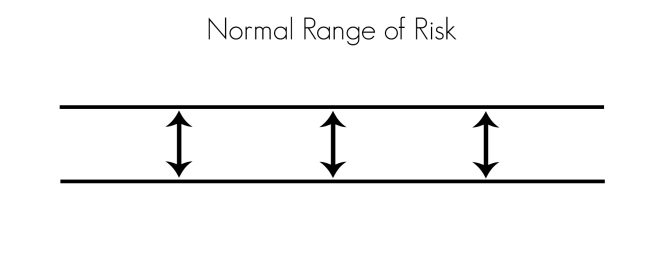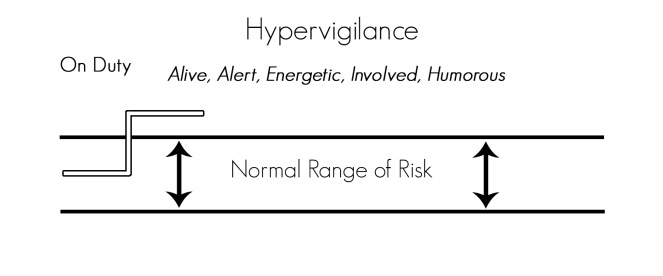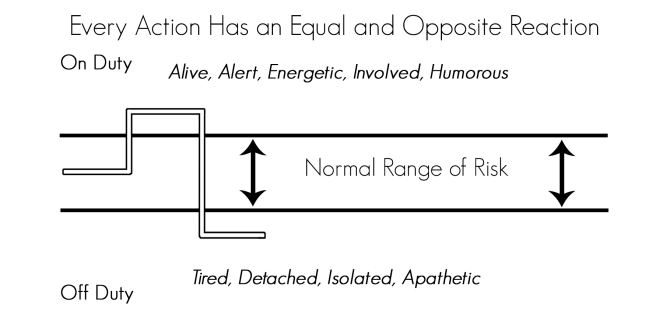(Reviews of Chapter 1 Chapter 2 Chapter 3 Chapter 4)
Over the past seven months I’ve tried really hard not to say “I wish I could go back in time and _________.” There are so many things I could put in that blank, but I know that I can’t go back in time. All I can do is recognize my mistakes, make amends, and strive towards a new life. BUT, I wish with all my heart that I could go back in time and read this book. I wish I could go back to that first month my husband was in the academy and know what lay ahead of me. I wish I could go back and read this when I started to notice the changes and get some answers. I wish I could have had the knowledge in this book so I could have offered the help and support he so desperately needed. I wish…but I can’t. What I CAN do is provide the information to officers and wives to NOW to help prevent what happened to me from happening to other couples and their families.

CHAPTER 5-Hypervigilence (with my own added commentary)
I am hoping that this chapter gives people that “ah-ha” moment. There is so much great information in this chapter about the behaviors of officers and it helps those of us on the outside to better understand what the heck is going on. Again, I wish that I had acquired this information years ago. Please read through this entire review of Chapter 5. It’s a lot of REALLY IMPORTANT information.
Gilmartin starts the chapter by asking “What causes the psychological changes in law enforcement personnel?…Is it WHAT cops see in the world? Or is is HOW cops must learn to see the world?” The answer is yes, to both questions. In order for officers to survive the streets they have to view the world as potentially hazardous. They actually develop a unique perceptual set, or way of viewing the world, that is different that any other profession.
On every shift officers are faced with a set of unknowns. These unknowns could be completely harmless or life threatening. The only way for officers to keep safe while on duty is to always assume every unknown is potentially lethal. If every situation is perceived as dangerous, then officers are always prepared.
BETTER SAFE THAN SORRY-“It is better to approach a harmless situation prepared for risk than to approach the lethal situation unprepared.” Something that starts out harmless can cost officers their lives, so they always need to be ready. In the police culture this is referred to as officer safety, but more accurately it’s call hypervigilance.
“Hypervigilance is the necessary manner of viewing the world from a threat-based perspective, having the mindset to see the events unfolding as potentially hazardous.” The perceptual set of hypervigilence give the officer increased awareness and preparedness, however it has a deep biological dimension.
EFFECTS OF HYPERVIGILANCE– When officers start their career the mindset is one of excitement and fun. “Man, I love this job.” The perceptual set of hypervigilence becomes less about officer survival and it becomes the officer’s way of perceiving the world. This is difficult for those outside the police world to understand because the average person doesn’t need to perceive the world as potentially life threatening every day, all day. Most people are living “between the line,” viewing the world as a basically safe place to live.

“One might experience it on occasion-for example, walking down an unknown dark streeet in a bad neighborhood at night might permit the average citizen to experience hypervigilence.” But normally these feelings of being on edge and ready to fight are not on the average person’s mind.
THE BIOLOGY OF HYPERVIGILANCE– “Hypervigilance is a biological state. Its foundation is in the neurological functioning of the brain. The brain has a set of structures, known as the reticular activating system (RAS), that determine the level of alertness that is necessary at any given time.” So when an officer perceives a threat of any kind, their RAS engages, which offers them increased alertness and awareness. This is a result of hypervigilance. This then increases the functions of the sympathetic branch of the autonomic nervous system.
The autonomic nervous system is what gives offices their “sixth sense,” or as I’ve heard “spidey sense.” When on duty officers operate at a much higher level than the average person.

This state of hypervigilence is what drives officers to do more, be more, get more. Everything is elevated to an abnormal level, making the experience fun and exciting. “While in a state of hypervigilance, officers also display good senses of humor-good but usually rather sick (yes yes yes to this, my husband’s sense of humor is something I have never gotten used to). This state of alert interactions with the environment, at mild to moderate levels, is not unpleasant to experience physically. In fact, it feels rather good physically-at least for the first few years of law enforcement career.”
One of the reasons officers develop such tight knit relationships is because of these expereicnes. This state of hypervigilance bonds them together and it becomes the glue of their relationships. Police relationships can be rather intense and very close knit.
HOW OTHERS PERCEIVE HYPERVIGILANCE-“Hypervigilance becomes the filter through which the law enforcement officer experiences the world.” Because of this reason their behavior can be confusing the not understood. Officers are perceived as rude, serious, and unfriendly, even when they are off duty.
THE APPEAL OF THE HYPERVIGILANT STATE– For many young officers the feeling of hypervigilance is fun and exciting. For veterans it’s the sense that “cop work gets in your blood.” Very few careers create this state of being. It’s exciting and many officers just can’t get enough of doing the job.
“On the flip side, what other career field also offers the depression, exhausting, and desire for social isolation that can typify a law enforcement officer’s life at the end of each workday?”
EVERY ACTION HAS AN EQUAL AND OPPOSITE REACTION-“When an officer goes off duty, the sympathetic branch of the autonomic nervous system, which controls on-duty reactions necessary for survival, gives way to the parasympathetic branch, which controls off duty reactions.”
When on duty, officers feel alive, engaged, and excited. But off duty it’s the complete opposite. They head dive into a detached, withdrawn, tired, and apathetic state of being. I can’t tell you how many Netflix binge watching afternoons my husband had. Or just plain apathy, not wanting to do anything but sit in the recliner all day.

Officers who experience this kind of biological roller coaster are “heat seekers.” Their interaction and on duty stimulation take a dive when they get home, making it difficult to respond to any type of normal interactions. Often those closest to the officer make these observations…
“He is different now that he’s a cop”
“He never talks anymore”
“He comes home, sits in front of the TV (or phone, or computer) , and tunes out the world.”
“The significant other in the officer’s life is describing the lower phase of the hypervigilance cycle. ‘She’s different now’-yes, all officers are different. They are experiencing hypervigilance and in many ways live in two different biological worlds. One is typified by alertness, involvement, aliveness, and social engagement, while the other world, at home, is typified by exhaustion, isolation, apathy, and on occasion, unfortunately, anger.”
I have to be honest, the above describes my husband nearly to a T. The man I married was a far cry from who he is today. I know that officers change and I never expected my husband to stay the same. But without acknowledging these issues and the changes officers go through, the problems of divorce, substance abuse, and broken relationships will continue to increase. This is my own opinion, but I believe this biological roller coaster is what causes officers to have affairs, gamble, and drink. Without the constant thrill of the job, they need that stimulation of excitement and adventure. That, or they just have to tune it all out. Numb it all and push it all down. WHEN WILL THIS CHANGE????
If you want more information on the biological roller coaster I HIGHLY recommend reading Gilmartin’s Brotherhood of Biochemistry.
Be sure to like The Armored Wife on Facebook! Please share these posts. The only way to create change is to work together and spread the message!

And after 18 with my LEO, our divorce was just finalized. Our kids are in therapy I am in therapy. When depression and hypervigilance turn their minds into thinking even their families are the bad guys, watch out. You will no longer feel sorry and confused. You will feel scared and abused and alone. And you will have no one to call, because brothers in blue are thicker than even children.
LikeLike
Praying for your heart and for healing! It is not easy being a LEO wife or ex-wife, and it is a burden that is bittersweet! Praying for hope and for the Lord to minister to you through this very difficult time!
LikeLike
Thank you Tina. Neither road is easy, and not that I’m on the ex-wife road, I have new challenges that are still difficult. But God is good, and he is faithful, and I have seen him do some amazing things. Thank you for your prayers!
LikeLike